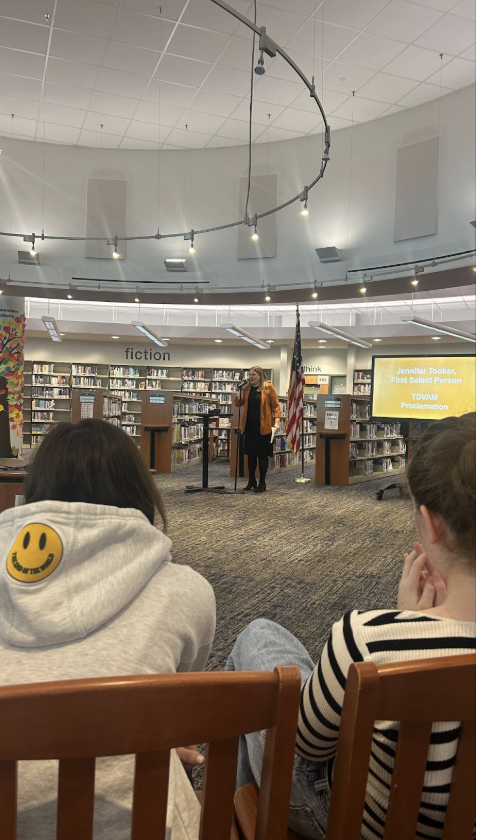For some students, it is not various combinations of AP classes, participation in multiple varsity sports, or even mediocre cafeteria food that induce unprecedented quantities of stress. Instead, it is their nurturing and all-too-caring parents who get the job done.
According to one Staples student, who wished to remain anonymous due to the nature of the subject, parents can perform stunning acts of demoralization upon their students by simply expecting too much. In addition, the student believes that the academic expectations that parents hold are not representative of his own goals.

“I presume that my parents want me to go to an ‘elite’ college so I can buy stuff—namely money, women, and power. On every day this month I’ve been forced to do SAT prep against my will. To be honest, I’d much rather play video games,” the student said.
In similar sentiment to the anonymous student, Principal John Dodig believes that there is certainly something to be lost from excessive parental involvement in a student’s academics and in the college process.
“When I hear from parents that a grade such as a ‘C+’ is considered to be ‘unacceptable’ in their family, they always lay the blame on the teacher in the form of petty criticism. I say it’s impossible to shield a child from failure forever, whether that means being cut from a sports team, not receiving a certain grade, or not getting into the college of the student’s choice,” Dodig said.
According to Dodig, Westport parents differ from those in other school districts because of their involvement in the school system. However, he believes that sometimes, positive parent involvement is corrupted into overbearing pressure upon students, teachers, and administrators.
“Parents who demand nothing less than an ‘A,’ in the mind of a growing child, translate their wants into a form of conditional love. Truthfully, that’s sad,” Dodig said.
Julie Horowitz, a social worker at Staples, offers a possible explanation as to why some parents become overly involved in a student’s academic performance in the event that they do not consider his or her grades to be satisfactory.
“Sometimes, parents solve what they perceive to a student’s problems in the same manner that they would if they were in the same situation. Unfortunately, real solutions depend on the individual in question and parents don’t really know if they’re working,” Horowitz said.
Nonetheless, guidance counselor PJ Washenko reinforces the concept that a limited amount of parental guidance upon a student can serve an important function towards reaching academic goals.
“Even though most adolescents want at least some form of independence from their parents, an occasional reminder to study a bit more can be positive- though some students are more receptive to parental advice than others. In moderation, involvement is almost always positive,” Washenko said.
However, parental involvement does not solely pertain to the academic arena. One student, Jacob Meisel ’13, believes that his parents go too far in monitoring his social life, especially through social networking sites such as Facebook.
“My mom reads my news feed and comments on my Facebook statuses. What’s even more disturbing is that she comments on my friends’ statuses as well. One time, my friend’s beehive collapsed, and my mom sent her condolences through the comments box. Frankly, it was a tad creepy,” said Meisel.
However, not all students have parents that interfere in academics or social issues. Another student, who will also remain anonymous due to the risk of self-incrimination, holds that parents can be extremely supportive if they simply leave a student alone.
“My parents have generally followed the philosophy of leaving me to my work. They respect my intelligence and decision making skills, and know that if I have I problem I’ll work it out on my own. I primarily determine my schoolwork and social life. I mean, if I went to a party and got tanked, they might care… possibly,” the second anonymous student said.
Ross Whelan ’13 holds that minimal parent involvement in his social life had made him a more rounded person.
“My grades have no bearing on my social life. I generally go out on Friday and Saturday nights, and I think that being able to spend time in the ways I choose makes me more likable. Because my parents aren’t so involved, it has made me a more chill individual,” Whelan said.
However, in addition to preparations for college and monitoring students’ social lives, parents often play a role in students’ extracurricular activities. Often, this amounts to parental involvement in high school sports.
Ben Greenberg ’12, who plays baseball for Staples, believes that his parents have helped him develop his sports skills from a young age, and continue to assist him currently by paying for private lessons.
“Playing catch with my dad as a kid is what developed my love and passion for the sport of baseball. The IST (Intensive Sports Training) lessons I go to every week are just increasing my ability at something I love to do,” Greenberg said.
However, according to Greenberg, some parents get overly involved with their children in regards to youth sports.
“There’s an athlete I know whose parents have continually made him go to lessons and clinics since a very young age, but he doesn’t really want to go anymore. For him, it’s gotten to the point that he doesn’t love the game anymore; he views it as a chore. I think that’s the worst—when parents are so intense about youth sports that they kill the child’s desire to play,” Greenberg said.
Dodig reiterates Greenberg’s thoughts to some extent, claiming that through the college process and in other scenarios, parents should leave students to their own devices.
“For example, I don’t think that parents should have any role in the college applications process besides meeting with the school guidance counselor and discussing financial aid options. At some point, a parent isn’t going to be there for the child. Even birds get it; either you fly or you hit the ground,” Dodig said.













































